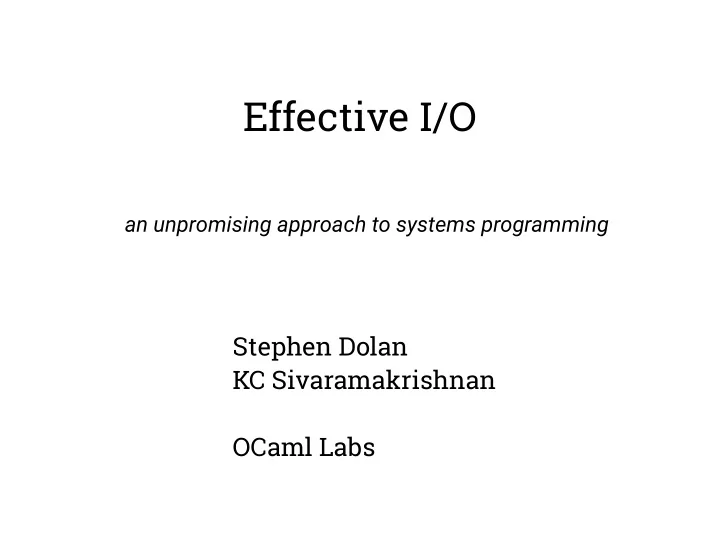

Effective I/O an unpromising approach to systems programming Stephen Dolan KC Sivaramakrishnan OCaml Labs
Effect handlers let do_stuff x = if x.is_bad then log “oh no”; process x 2
Effect handlers let do_stuff x = if x.is_bad then raise PrettyBad; process x match ... with | result -> result | exception PrettyBad -> log “it's pretty bad”; exit 1 3
Effect handlers let do_stuff x = if x.is_bad then raise PrettyBad; process x match ... with | result -> result | exception PrettyBad -> (* wish it kept going *) 4
Effect handlers let do_stuff x = if x.is_bad then raise PrettyBad; process x match ... with | result -> result | exception PrettyBad -> continue 5
Effect handlers let do_stuff x = if x.is_bad then perform PrettyBad; process x match ... with | result -> result | effect PrettyBad k -> continue k 6
Scheduling tasks let run_q = Queue.create () let enqueue k = Queue.push k run_q let rec dequeue () = if Queue.is_empty run_q then () else continue (Queue.pop run_q) () 7
Scheduling tasks effect Yield : unit effect Fork : (unit -> unit) -> unit let rec schedule f = match f () with | () -> dequeue () | effect Yield k -> enqueue k; dequeue () | effect (Fork f) k -> enqueue k; schedule f 8
Direct-style I/O let copy_channels = let buf_len = 65536 in let buf = Bytes.create buf_len in let rec loop ic oc = match input ic buf 0 buf_len with | 0 -> () | n -> output oc buf 0 n; loop ic oc in loop 9
An effective stdlib type in_channel = Reader.t effect Input : in_channel * bytes * int * int -> int let input ic buf pos len = perform (Input (ic, buf, pos, len)) 10
Direct-style with Async val run : (unit -> 'a) -> 'a Deferred.t let run f = match f () with | x -> return x | effect (Input (ic, buf, pos, len)) k -> Reader.read ic buf ~pos ~len >>= fun x -> continue k x 11
Direct-style I/O ● Simple I/O interfaces use direct calls ● Effjcient ones use callbacks, for overlapping ● With effects, we can write the simple code but run the fast code 12
Mixing styles ● Effects let us mix direct and monadic code ● Parts of the code can choose whether they need to control scheduler interactions ● Libraries can expose code without imposing a particular I/O style 13
Managing resources let file = open_in “words.txt” in match parse_contents file with | result -> close file; result | exception e -> close file; raise e 14
Managing resources ● Computations holding resources are linear – so their continuations are too! ● Linear continuations are very, very fast ● Lacking linear types, we fake them dynamically 15
Blocking I/O ● The operating system provides select(), telling us whether I/O will block ● But it lies, and it lies, and it lies. ● Async uses thread pools to deal with this 16
Thread pools vs. effects ● For operations which happen not to block, thread pools have high overhead ● With effects, we don't have to decide in advance whether to switch to another thread ● We can invoke continuations on any C thread 17
Overlapping with effects | effect (Delayed id) k -> Hashtbl.add ongoing_io id k | effect (Completed id) k -> let k’ = Hashtbl.find ongoing_io id in Hashtbl.remove ongoing_io id; enqueue (fun () -> continue k ()); continue k’ () 18
Questions? 19
Recommend
More recommend